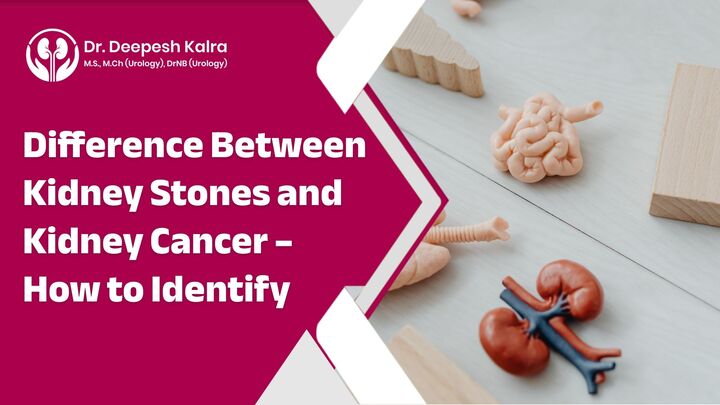Difference Between Kidney Stones and Kidney Cancer – How to Identify
Posted by SEO Expert
Filed in Health 203 views
Introduction
It's easy when you feel your lower back or notice blood in the urine. Is it a kidney stone, or can it be something more serious like kidney cancer? Both conditions share some similar symptoms, which confuse it for many people. The truth is that the kidney cancer treatment in Jaipur has come quickly, the difference is actually the difference in the results.
Let's go down from this step in regular English - so you know what to see, when you should be calm and when to take hold.
The basics of the kidney - what are they doing?
Think of your kidneys as a natural filter. Every single day they clean the blood, remove waste and maintain the correct balance between fluids and minerals. But when something goes wrong - like stone production or abnormal cells grows - interferes with the whole system.
What is kidney stein?
Kidney stones are like a small "pebble" formed by minerals and salts in the urine. Imagine what happens when sugar sits under your tea and begins to crystallize - what are the stones in your kidneys.
Cause: Dehydration, too much salt, overweight or even genetics.
Size: They can grow as small or golf balls like sand grains.
Pain: Classic signal? Suddenly, sharp, unbearable pain.
What is kidney cancer?
On the other side of the spectrum, kidney most cancers is not about crystallized waste - it is approximately cells that develop uncontrollably. These abnormal cells shape a tumor, that can both be mild (non-cancer) or deadly (most cancers).
Cause: Exact causes are not continually clean, but the risk consists of smoking, obese, excessive blood pressure and circle of relatives history.
Effect: Unlike stones, cancer can first grow quietly with out ache, which is why it's miles frequently tough to hit upon fast.
Kidney stones versus symptoms of kidney cancer
Symptoms of kidney stones
Suddenly, fast, back or edge pain
Lower stomach or back pain
Urine
Vomiting
Repeated request to urinate
Symptoms of kidney cancer
Constant slow pain (not always sharp like stones)
Blood in urine (but without "stone-pasting" pain)
Unexplained weight loss
Fatigue
Fever
A lump in the stomach or side
Big differences: Stoner cries to suddenly take into account pain, while the cancer often whispers calmly until it grows.
How doctors diagnose differences
For kidney stones
Ultrasound or CT scan: Displays the stones clearly.
Urine test: Crystals, infection or blood manifest.
For kidney cancer
Imaging test (CT, MRI, ultrasound): Spot tumor.
Biopsy: Confirms if mass is cancer.
Blood tests: Can sign organ function and effects of cancer.
Risk factor - is more likely to get each?
Kidney stone
Don't drink enough water
High diet in salt or protein
Overweight
Family history with stones
Kidney cancer
Smoking
Long time hypertension
to be overweight
Family history with kidney cancer
Age (common in more than 50 people)
Treatment Options - Stone vs Cancer
Kidney stone
Small stones: often pass naturally with a lot of water.
Pain relief done: to deal with discomfort.
Shock wave therapy (ESWL): Breaks stones into small pieces.
Surgery (rarely case): If the stone is too large to pass.
Kidney cancer
Surgery: Removal of parts or all kidneys.
Target therapy and immunotherapy: attack cancer cells directly.
Radiation therapy: in specific cases.
Regular follow -up: to monitor repetition.
When should you consult a doctor immediately
Don't wait if you notice:
Blood in your urine (especially if it happens).
Pain that does not disappear.
Unexplained weight loss or fatigue.
A lump or swelling on your side.
Can Kidney Stones Become Kidney Cancer?
No, kidney stones can’t become cancer. The tricky part is that both can cause you to see blood in your urine, which makes it dangerous to assume that blood is just stones. What feels like a stone flare-up could, in rare cases, be an early sign of a tumor, and if you don’t get it checked, you might miss a chance to catch the cancer early.
How to Keep Your Kidneys Safe
To Prevent Stones
-Keep a steady stream of water: Dimensions 2 to 3 liters a day.
- Cut down salt and packed food.
- Fill your plate with more fruits and vegetables.
- Try to live on a healthy weight.
To Lower Cancer Risk
- If you smoke, quit.
- Remember your blood pressure.
- Transfer each day and choose a balanced diet.
- Plan regularly check, more often if cancer runs in your family.
Final Word
On the surface, kidney stones and kidney cancer can look alike because they can both lead to blood in your urine. The way they form in your body and the way your doctor will treat them, however, is miles apart. Never guess if you notice warning signs; see a doctor. The right doctors can change everything at the right time. For careful testing, clear answers and proper treatment, calling the Best Urologist in Jaipur may be a phone call that keeps your kidneys and brain easy.
FAQs
Q1. Will small kidney stones pass on their own?
Yes, small stones usually go out on their own if you drink enough water and handle the pain.
Q2. Does blood in urine mean kidney cancer?
No way. Blood stone, infections or other problems may come, but you should still consult a doctor immediately.
Q3. Do men have a higher risk of kidney cancer?
Yes, men have almost twice the possibility of developing kidney cancer compared to women.
Q4. Will change your diet stop the kidney stones?
Diet rich in fluids, low salt, and can reduce the risk of stones filled with fruits and vegetables.
Q5. Is kidney cancer always death sentence?
If found early. Surgery and new means can often cure it.
